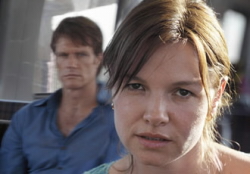Stuart:
These days film audiences are pretty familiar with the notion of multiple interweaving narratives. Robert Altman films were challenging in their day, but now we are all accustomed to following many characters and waiting to see how their lives intersect. Look Both Ways can be placed in this category but thankfully isn’t at all trite or preachy in the sense that Hawaii, Oslo, or even Magnolia was.
 Sarah Watt’s feature is a beautiful tale, dissecting the ripple effect tragedy can have on the community. We often hear on the news of disasters in faraway countries, but often take in the information without thinking, and then change the channel. It’s only when the tragedy is close to home, or even worse, involves a loved one, that we are put in the position of having to understand why such things happen.
Sarah Watt’s feature is a beautiful tale, dissecting the ripple effect tragedy can have on the community. We often hear on the news of disasters in faraway countries, but often take in the information without thinking, and then change the channel. It’s only when the tragedy is close to home, or even worse, involves a loved one, that we are put in the position of having to understand why such things happen.
The phrase ‘it was meant to be’ is mentioned early in Look Both Ways, but even the speaker of the line knows that this is a cop out. To say ‘it was meant to be’ is to not only absolve oneself from blame, but also an attempt to avoid the consequences of truly pondering the notion of coincidence, fate and death. In the course of Look Both Ways, many people are forced to re-evaluate themselves and their role in the world in the wake of a tragic death. We have a colourful array of characters, from the lonely Meryl (Justine Clarke of Japanese Story, easily the most powerful presence in the film) to the vibrant yet angry Andy (Anthony Hayes – Ned Kelly), and they are all human enough to have their own admirable qualities as well as flaws. Second billed William McInnes (Dirty Deeds; and the narrator of Adam Elliot’s earlier series of animations Cousin, Brother and Uncle) was a little lacklustre in comparison to Clarke, but I’ve always found him to be lacking in charisma for my liking.
The film is strengthened by the occasional foray into animation and montage. Watt is clearly comfortable directing animation. Together with Lucinda Clutterbuck, she brought to life the animals of ‘The Web’ in the series of short films that have had many runs on Australian television over the years. These sequences in Look Both Ways are wonderfully effective and often quite shocking – revealing characters’ innermost fears, and perversely, their dreams.
This is, overall, a consciously uplifting film. These people have made bad choices but are also the victims of circumstance, and of course, one’s true colours shine the brightest in the face of adversity. Look Both Ways is a powerful, yet at the same time thankfully, humble feature – there is very little if any preaching to be found here. Just great, solid drama.
Rating: